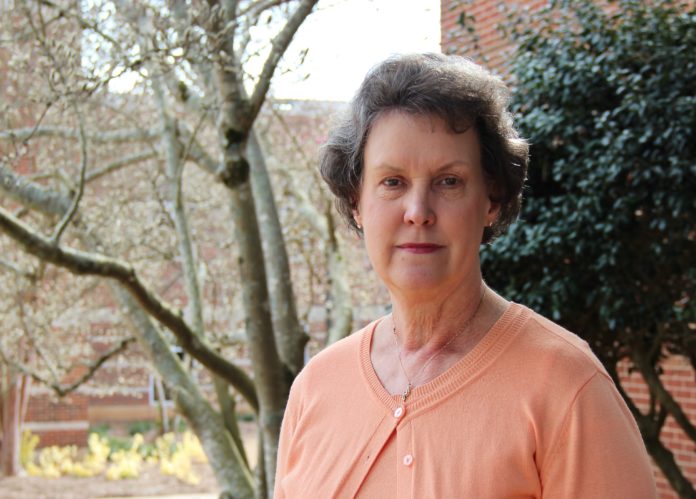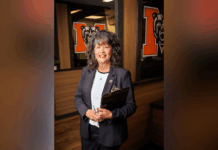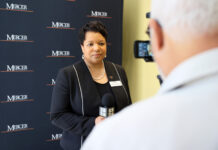Dr. Susan W. Miller has worked under three Mercer University presidents and four College of Pharmacy deans during her more than 40 years at Mercer. She’s seen a lot of changes in the college and the pharmacy profession over the years, but her dedication to teaching and learning has remained steadfast.
Dr. Miller, a professor of pharmacy practice, is a native of Atlanta but grew up in Florida, where her family had relocated to better cope with her childhood asthma. Dr. Miller credits her parents with having an impact on her future career. She spent a lot of time waiting with her late father, 1950 Mercer graduate and Methodist minister Clarence W. Whitley, in pharmacies for her prescriptions. Her interest in teaching came from her mother, the late Mary Emily Smith Whitley, an elementary school teacher who graduated from LaGrange College and Stetson University.
When it came to her education, Dr. Miller followed in her father’s footsteps and chose Mercer.
“I knew I wanted to go into health care and pharmacy because I was so sick as a child,” she said. “Living in Florida and looking for a school with a pharmacy program, the University of Florida was an option, but I wanted a smaller college community, and Mercer seemed to be the best fit. Once we visited the Mercer campus, I knew that was where I should be.”
She completed her pre-pharmacy requirements on Mercer’s Macon campus and then went to Mercer’s Southern School of Pharmacy in Atlanta, where she earned a Bachelor of Science in Pharmacy in 1979 and a Doctor of Pharmacy in 1983. While completing the latter degree, she worked as an instructor and pharmacist at the school.
Dr. Miller intended to go into community retail practice but also felt drawn to the area of geriatric pharmacy following an internship with a long-term care facility. After finishing her Pharm.D., she was invited to return to Mercer’s pharmacy school to take a faculty position developing and teaching a new geriatric curriculum, which she counts among her proudest career achievements.
“I started my tenure at Mercer as an instructor, but earning the Pharm.D. qualified me for appointment in a tenure-track faculty position,” said Dr. Miller, a board-certified geriatric pharmacist and fellow of the American Society of Consultant Pharmacists. “I was promoted through the ranks, and now I am a tenured professor. It was a tough road, as I was a woman in a primarily man’s profession, I was young, and I was on a tenure track where there were not many opportunities for scholarship in the area of geriatric pharmacy practice. So I had to be creative.”
Dr. Miller said she is grateful for the many types of support provided by the College and the University that have contributed to her professional success.
She has also held several administrative positions over the years in the College of Pharmacy, including associate dean and chair of pharmacy practice, but she always came back to teaching because that was her true passion.
“Teaching is one of the most important responsibilities that a person can assume,” she said. “You should do things that instill in people the interest in lifelong learning. What I try to do in my teaching is keep things current and cutting edge yet grounded in foundational topics and skills. I try to partner with the students in learning. We are all on a journey of learning, and we should take every situation we have and try to learn something.”
She enjoys helping students meet their goal of becoming a pharmacist and giving them the tools they need to be successful. Being a professor also keeps her engaged in her own learning, and she loves tackling new technologies and discovering new teaching methods.
Dr. Miller said her current primary teaching role is exploring fundamentals of pharmacy practice with first-year students, but she is also responsible for delivering the ethics thread of the curriculum and maintains a presence in teaching geriatric content.
“For the first-year student pharmacists, I model the behaviors of the pharmacist, the professional approach. I teach them the basics — all the softer skills that a pharmacist needs to have,” she said.
As another way to help future pharmacists, Dr. Miller and husband Kenneth T. Miller, who earned a Bachelor of Science in Pharmacy at Mercer in 1977, established an endowed scholarship for Mercer pharmacy students about a decade ago.
“It’s something we felt led to do,” she said. “My husband and I believed that was something we could do that would be lasting.”
Dr. Miller’s “service-leadership has spanned decades,” and she’s played an integral part in the College’s growth and development, College of Pharmacy Dean Dr. Brian Crabtree said. She has served on the curriculum committee, Accreditation Council for Pharmacy Education steering committee, and college promotion and tenure committee, among many other roles. She spearheaded initiatives to increase experiential learning and service-learning opportunities for students and elective course offerings developed by faculty.
“Dr. Miller has demonstrated a long and sustained level of distinguished service to the College,” said Dr. Crabtree, who was Mercer classmates with Dr. Miller. “She’s seen it all, and she’s done it all with excellence. She’s completely passionate and dedicated to Mercer.”
A few years ago, Dr. Miller developed the College’s mastery grading approach, which requires students to meet minimum competencies in every aspect of a course rather than averaging their grades, she said. In addition, she has been leading faculty in the implementation of a revised skills curriculum.
She is currently working with Mercer faculty and Emory University on a federally funded grant project to develop a team delivery care model for geriatric patients that will be made available to all health care professions.
“Having served with four deans, Dr. Miller is able to provide historical context to important issues addressed by the College,” said Dr. Candace Barnett, executive associate dean. “Dr. Miller helped to establish geriatric pharmacy as a specialty area within pharmacy education and pharmacy practice both nationally and at Mercer.”
When Dr. Miller isn’t on the job at the College of Pharmacy, she enjoys playing classical piano, cooking, and attending car shows with her husband in their own classic cars. She isn’t looking to retire anytime soon, but when she does, she hopes to continue giving back to Mercer by teaching an elective course or serving in an adjunct role.










